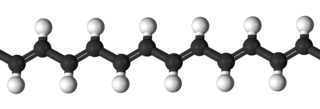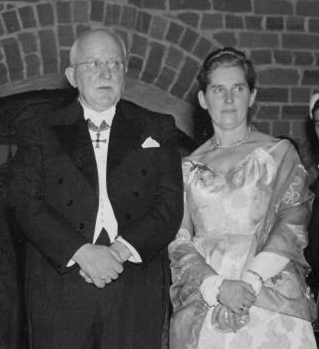Related Research Articles

Hermann Staudinger was a German organic chemist who demonstrated the existence of macromolecules, which he characterized as polymers. For this work he received the 1953 Nobel Prize in Chemistry.

Polymer science or macromolecular science is a subfield of materials science concerned with polymers, primarily synthetic polymers such as plastics and elastomers. The field of polymer science includes researchers in multiple disciplines including chemistry, physics, and engineering.
Dieter Fenske is a German inorganic chemist.
Walter Kaminsky is a German chemist who specializes in olefin polymerization and plastic recycling. He discovered the high activity of Group 4 metallocene/methylaluminoxane (MAO) mixtures as catalysts for olefin polymerization in 1980.

The Alfred-Stock Memorial Prize or Alfred-Stock-Gedächtnispreis is an award for "an outstanding independent scientific experimental investigation in the field of inorganic chemistry." It is awarded biennially by the German Chemical Society. The award, consisting of a gold medal and money, was created in 1950 in recognition of the pioneering achievements in inorganic chemistry by the German chemist Alfred Stock. In 2022, the GDCh board decided to change the name of the previous Alfred Stock Memorial Prize. The new name is Marianne Baudler Prize.
Heino Finkelmann is a retired German chemist in the area of liquid-crystalline elastomers.

Egbert (Bert) Willem Meijer is a Dutch organic chemist, known for his work in the fields of supramolecular chemistry, materials chemistry and polymer chemistry. Meijer, who is distinguished professor of Molecular Sciences at Eindhoven University of Technology (TU/e) and Academy Professor of the Royal Netherlands Academy of Arts and Sciences, is considered one of the founders of the field of supramolecular polymer chemistry. Meijer is a prolific author, sought-after academic lecturer and recipient of multiple awards in the fields of organic and polymer chemistry.

The German Chemical Society is a learned society and professional association founded in 1949 to represent the interests of German chemists in local, national and international contexts. GDCh "brings together people working in chemistry and the molecular sciences and supports their striving for positive, sustainable scientific advance – for the good of humankind and the environment, and a future worth living for."

Magda Staudinger was a Latvian biologist and botanist who studied macromolecules with her husband Hermann Staudinger and their application to biology. She was acknowledged as his collaborator when he won the Nobel Prize for Chemistry, and she published seven volumes of his works after his death. She was awarded the Grand Order of the Latvian Academy of Sciences Medal for her contributions to the furtherance of science.
Brigitte Voit is a German chemist and professor of chemistry. She holds the chair Organic Chemistry of Polymers at the Faculty of Chemistry of the TU Dresden and is head of the Institute of Macromolecular Chemistry at the Leibniz Institute of Polymer Research in Dresden. From September 1, 2002, to July 31, 2022, she was also member of the Board of Management/CSO of the IPF Dresden.
Marianne Baudler was a German chemist. She is known for her research on phosphorus.
Stefanie Dehnen is a German chemist. She is the executive director of the Institute of Nanotechnology at the Karlsruhe Institute of Technology. From 2006 to 2022, she was a full professor for inorganic chemistry at the University of Marburg. She has received numerous awards for her research in inorganic chemistry. In 2024 and 2025, she will be the president of the German Chemical Society.
Arndt Simon is a German inorganic chemist. He was a director at the Max Planck Institute for Solid State Research in Stuttgart.

Klaus Müllen is a German chemist working in the fields of polymer chemistry, supramolecular chemistry and nanotechnology. He is known for the synthesis and exploration of the properties of graphene-like nanostructures and their potential applications in organic electronics.
Inke Siewert is a professor for Inorganic Chemistry at University of Göttingen. Her research focuses on activation of small molecules by transition metal complexes and molecular electrochemistry.

Regina Palkovits is a German chemist who is a Professor of Chemistry at the RWTH Aachen University. Her research considers heterogenous catalysis. She was elected a Fellow of the North Rhine-Westphalian Academy of Sciences, Humanities and the Arts in 2020. In 2023 she was appointed as Director at the Institute for a Sustainable Hydrogen Economy (INW) at Forschungszentrum Jülich.

The Cluster of Excellence Unifying Systems in Catalysis (UniSysCat) is an interdisciplinary research network funded by the German Research Foundation (DFG) as part of the federal and state initiative called the Excellence Strategy of Germany, Exzellenzstrategie. This funding period runs from January 1, 2019, to December 31, 2025.
Arne Thomas is a German chemist who researches porous and nanostructured materials for catalytic applications.
Rainer Haag is a German chemist and Chair Professor of Organic and Macromolecular Chemistry at the Free University of Berlin. He conducts research together with his working group on preventing aggressive pathogens and viruses from entering the body's cells using nanotechnology. He heads a team composed of biochemists, physicians, biologists and physicists.
Anna Fischer is a German chemist who is a Professor of Nanomaterials at the University of Freiburg. Her research considers the development of nanomaterials for electrocatalysis.
References
- ↑ Mülhaupt, Rolf (20 February 2004). "Hermann Staudinger and the Origin of Macromolecular Chemistry". Angewandte Chemie International Edition. 43 (9): 1054–1063. doi:10.1002/anie.200330070. PMID 14983438.
- ↑ "Hermann Staudinger Award | Gesellschaft Deutscher Chemiker e.V." en.gdch.de.
- ↑ "Prof. Dr. rer. nat. Dr. rer. nat. h.c. Dipl.-Chem. Hansjörg Sinn : Akademie der Wissenschaften und der Literatur | Mainz". www.adwmainz.de.
- ↑ "Hermann-Staudinger-Preis an Wolfgang Peter Meier". www.chemie.de (in German). Retrieved 2024-06-19.
- ↑ "Martin Möller was awarded the Hermann-Staudinger-Preis | DWI". www.dwi.rwth-aachen.de.
- ↑ "Klaus Müllen receives Hermann Staudinger Award 2016". www.mpip-mainz.mpg.de.
- ↑ Hickman, Daniel (24 September 2018). "Hermann Staudinger Prize for Brigitte Voit". ChemistryViews.
- ↑ Berlin, UniSysCat. "UniSysCat: GDCh-Prize for UniSysCat Researcher Markus Antonietti". www.unisyscat.de.
- ↑ Goedecke, Catharina (12 September 2022). "Hermann Staudinger Prize for Bert Meijer". ChemistryViews.